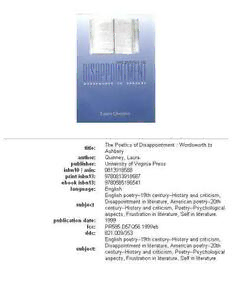
The poetics of disappointment: Wordsworth to Ashbery PDF
01999·0.402 MB·English
Most books are stored in the elastic cloud where traffic is expensive. For this reason, we have a limit on daily download.
Preview The poetics of disappointment: Wordsworth to Ashbery
Description:
The Poetics of Disappointment offers nothing less than a complete revision of our understanding of romantic poetry. By examining the lineage of Wordsworth, Shelley, Stevens, and Ashbery, Quinney challenges Harold Bloom's identification of major romantic poems as "crisis lyrics" and questions his idea that the disappointment these poets explore is compensated by their celebration of a heroic self. Rather, Quinney argues, the form of disappointment examined by the romantic poet often finds him bewildered and oppressed, in a state beyond the simple failure of literary ambition or romantic love.Beginning with Wordsworth's major autobiographical poems, including "Tintern Abbey" and the Intimations Ode, Quinney identifies a strain of romantic and postromantic lyric that devotes itself to capturing a disoriented sadness, a disappointment in which the self is isolated and frozen. She considers poems by Shelley, Stevens, and Ashbery, which she argues concern not specific disappointments but a psychic state of being disappointed. According to Quinney, an experience of loss has fractured and paralyzed the formerly hopeful self because that self seems in retrospect arrogant and na?ve&emdash;-or, as Ashbery puts it, the dream sustaining all other dreams dies.Quinney's critical prose is wonderfully fluent, conversant with theory but never relying on jargon to make her complex and sensitive argument. Drawing on the psychological insights of Freud and Klein and on the philosophy of Kierkegaard, Quinney sees in her paradigm of disappointment a sophisticated representation of self that goes beyond mere pathos or melancholia. The history of romantic and postromantic poetry, she finds, is not a history of ambitious self-assertion but a collective testimony of chagrin over the broken promises of the self.
See more
The list of books you might like
Most books are stored in the elastic cloud where traffic is expensive. For this reason, we have a limit on daily download.
